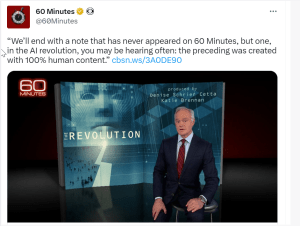 After seeing this message on Twitter regarding 60 Minutes’ final note, I started to wonder about the impact of ChatGPT on education. Recently we had an incident where a student decided to use ChatGPT and submit an assignment instead of crafting the essay with his own words. The classroom teacher was quite upset, and the student ended up in my office for a “chat” ~ no pun intended. I’ll admit that there was a part of me that was somewhat impressed with his ingenuity. In knowing this student and how he navigates life at school, we all know that the likelihood of him being invested in writing an essay about homework is very limited.
After seeing this message on Twitter regarding 60 Minutes’ final note, I started to wonder about the impact of ChatGPT on education. Recently we had an incident where a student decided to use ChatGPT and submit an assignment instead of crafting the essay with his own words. The classroom teacher was quite upset, and the student ended up in my office for a “chat” ~ no pun intended. I’ll admit that there was a part of me that was somewhat impressed with his ingenuity. In knowing this student and how he navigates life at school, we all know that the likelihood of him being invested in writing an essay about homework is very limited.
I’m not sure that the educator was pleased with my response as instead of reprimanding the student, I took this opportunity to share my interest about ChatGPT and wondered if instead of rewriting the essay, the student could critique the essay that was generated and list the differences between his thoughts on the topic and the one that he tried to submit.
As always, we need to know our students, their interests and their challenges when selecting assignments. For a student who rarely completes tasks in class, it is highly unlikely that they are going to have an opinion about homework. For them, it is a foreign concept. However, this student has a great interest in technology and hence their method of completing the assignment.
Punishing them for using ChatGPT, can not be our response. As educators we’re going to have to acknowledge its existence and find ways to help students effectively use it as a tool to supplement their learning, not replace it.
Will ChatGPT ever replace educators??? What a scary thought. Education is so much more than filling students’ minds with facts and details. Good educators are intuitive. They know when it’s time to tackle new topics, different strategies to engage a wide range of learners and they know when today may not be the best day to write an essay. Instead, maybe today is good day to have a conversation (to build ideas/vocabulary, so that when students dive into their writing tasks, they have lots of information).
Teaching is just as much a science as it is an Art ~ and more importantly an Art form that requires flexibility, a growth mindset, determination, perseverance and patience.
We know that students learn best from educators who care deeply for them. I’m not sure that AI can possess all of those qualities.
I asked Chat GPT “Will Chat GPT replace human content and knowledge?” and this was the response that was generated.
Chat GPT and similar language models have the potential to provide valuable assistance in various domains, including generating content and answering questions. However, it is unlikely that they will completely replace human content and knowledge.
While Chat GPT can generate text based on patterns it has learned from its training data, it lacks true understanding and consciousness. It operates based on statistical patterns and does not possess human-like intuition, emotions, or real-world experiences. This limitation makes it prone to errors, biases, and misunderstandings, which can be significant drawbacks in certain situations.
Human content and knowledge are built on a foundation of critical thinking, creativity, empathy, and contextual understanding. Humans can grasp complex nuances, adapt to new situations, and bring personal insights and expertise to their work. They possess the ability to reason, interpret, and synthesize information from various sources, which is crucial for tasks that require judgment, analysis, and decision-making.
That being said, Chat GPT and similar AI models can be valuable tools to enhance human productivity, automate repetitive tasks, and provide information and assistance. They can help streamline certain processes, generate ideas, and offer suggestions. However, human involvement and oversight are still necessary to ensure accuracy, ethics, and quality in content creation and knowledge dissemination.
In summary, while Chat GPT has its merits, it is unlikely to completely replace human content and knowledge due to its limitations and the unique abilities humans possess. The ideal scenario is a collaborative approach where humans and AI work together to leverage the strengths of both.
I wonder if I need to adjust my tag line from “Come write with me” to “The preceding blog was created with 100% human content”.
